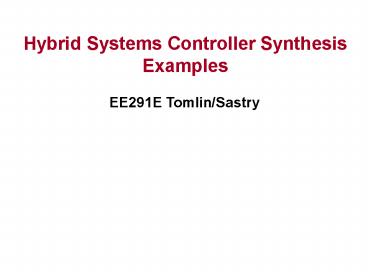Validating a Hamilton-Jacobi Approximation to Hybrid System Reachable Sets - PowerPoint PPT Presentation
1 / 27
Title:
Validating a Hamilton-Jacobi Approximation to Hybrid System Reachable Sets
Description:
* Simple system shown, which I can solve. Want to tackle more complex systems. Given the proliferation of interacting continuous and discrete systems, we would like ... – PowerPoint PPT presentation
Number of Views:124
Avg rating:3.0/5.0
Title: Validating a Hamilton-Jacobi Approximation to Hybrid System Reachable Sets
1
(No Transcript)
2
Example 1 Aircraft Collision Avoidance
- Two identical aircraft at fixed altitude speed
y
v
y
u
x
v
d
3
Continuous Reachable Set
4
Collision Avoidance Filter
- Simple demonstration
- Pursuer turn to head toward evader
- Evader turn to head right
Movies
5
Collision Avoidance Control
http//www.cs.ubc.ca/mitchell/ToolboxLS/
6
Overapproximating Reachable Sets
Exact
Approximate
Overapproximative reachable set
Khrustalev, Varaiya, Kurzhanski
- Polytopic overapproximations for nonlinear games
- Subsystem level set functions
- Norm-like functions with identical strategies
to exact
Hwang, Stipanovic, Tomlin
1 sec on 700MHz Pentium III (vs 4 minutes for
exact)
7
Can separation assurance be automated?
- Requires provably safe protocols for aircraft
interaction - Must take into account
- Uncertainties in sensed information, in actions
of the other vehicle - Potential loss of communication
- Intent, or non-intent
8
(No Transcript)
9
Example 2 Protocol design
unsafe set without maneuver
safe
unsafe
?
unsafe set with maneuver
10
Protocol Safety Analysis
- Ability to choose maneuver start time further
reduces unsafe set
safe with switch
unsafe with or without switch
safe without switch unsafe to switch
11
Implementation a finite automaton
- It can be easier to analyze discrete systems than
continuous use reachable set information to
abstract away continuous details
q5
qu
q3
q4
q2
q1
12
Example 3 Closely Spaced Approaches
Photo courtesy of Sharon Houck
13
Example 3 Closely Spaced Approaches
EEM Maneuver 1 accelerate
EEM Maneuver 2 turn 45 deg, accelerate
EEM Maneuver 3 turn 60 deg
evader
Rodney Teo
14
Sample Trajectories
Segment 2
Segment 3
Segment 1
15
Tested on the Stanford DragonFly UAVs
Dragonfly 3
Dragonfly 2
Ground Station
16
Tested at Moffett Federal Airfield
Accelerate and turn EEM
Put video here
North (m)
East (m)
Separation distance (m)
EEM alert
Above threshold
time (s)
17
Tested at Moffett Federal Airfield
Coast and turn EEM
Put video here
North (m)
East (m)
Separation distance (m)
EEM alert
Above threshold
time (s)
18
Tested at Edwards Air Force Base
T-33 Cockpit
DARPA/Boeing SEC Final Demonstration F-15
(blunderer), T-33 (evader)
19
Photo courtesy of Sharon Houck Tests conducted
with Chad Jennings
20
Implementation Display design courtesy of
Chad Jennings, Andy Barrows, David Powell
R. Teos Blunder Zone is shown by the yellow
contour Red Zone in the green tunnel is the
intersection of the BZ with approach path. The
Red Zone corresponds to an assumed 2 second pilot
delay. The Yellow Zone corresponds to an 8
second pilot delay
21
R. Teos Blunder Zone is shown by the yellow
contour Red Zone in the green tunnel is the
intersection of the BZ with approach path. The
Red Zone corresponds to an assumed 2 second pilot
delay. The Yellow Zone corresponds to an 8
second pilot delay
22
Map View showing a blunder The BZ calculations
are performed in real time (40Hz) so that the
contour is updated with each video frame.
23
Map View with Color Strips The pilots only need
to know which portion of their tunnel is off
limits. The color strips are more efficient
method of communicating the relevant extent of
the Blunder zone
24
Example 4 Aircraft Autolander
- Aircraft must stay within safe flight envelope
during landing - Bounds on velocity ( ), flight path angle (
), height ( ) - Control over engine thrust ( ), angle of
attack ( ), flap settings - Model flap settings as discrete modes
- Terms in continuous dynamics depend on flap
setting
body frame
wind frame
inertial frame
25
(No Transcript)
26
Autolander Synthesizing Control
- For states at the boundary of the safe set,
results of reach-avoid computation determine - What continuous inputs (if any) maintain safety
- What discrete jumps (if any) are safe to perform
- Level set values and gradients provide all
relevant data
27
Application to Autoland Interface
- Controllable flight envelopes for landing and
Take Off / Go Around (TOGA) maneuvers may not be
the same - Pilots cockpit display may not contain
sufficient information to distinguish whether
TOGA can be initiated
existing interface
controllable TOGA envelope
intersection
revised interface
controllable flare envelope































